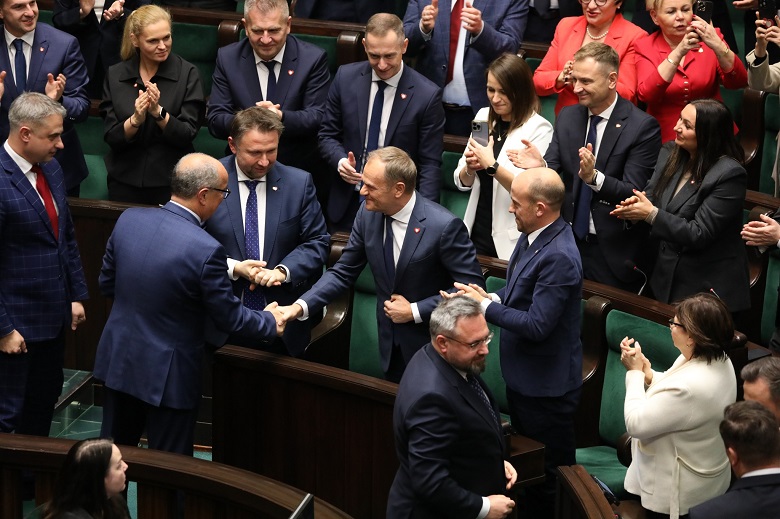Incoming Polish PM Tusk presents cabinet and programme ahead of confidence vote
Donald Tusk, who was yesterday nominated by parliament to be Poland’s new prime minister, today outlined the programme of his proposed government and the ministers who will serve in it (whose names and positions are listed in full at the bottom of this article). His administration will face a vote of confidence later today.
Tusk pledged to mend Poland’s fractured relations with the EU, to restore the rule of law and to improve women’s access to abortion – thereby undoing many of the changes introduced under the outgoing national-conservative Law and Justice (PiS) government, which has ruled Poland since 2015.
“The new coalition guarantees that we will return to the place Poland deserves,” declared Tusk during a two-hour speech to the Sejm, the lower house of parliament, which will later hold the vote of confidence.
If, as expected, Tusk’s proposed government wins that vote, it will be sworn into office by President Andrzej Duda tomorrow morning.
During his speech, Tusk acknowledged that the alliance he leads – which he labelled the “15 October Coalition”, referring to the date of the elections at which it won a parliamentary majority – contains “very different parties with different views”, ranging from left to centre-right.
But they came together because “we agreed to respect the foundations common to everyone” and because “a divided nation will be more exposed to the risks that are shaking our region”.
Tusk pledged that, under their rule, “Poland will be a strong ally of NATO and the United States” while also “regaining its leadership position in the European Union”.
Under PiS, Poland has often clashed with Brussels over issues including the rule of law and climate policy. But Tusk today declared that “the stronger the European community is, the stronger we are”.
“Only a united West, including Europe, can help Ukraine win this war,” added Tusk, who said that his government would show “full determination in helping Ukraine from day one”.
Tusk also pledged that his justice minister, Adam Bodnar, would work to “quickly and absolutely restore the rule of law”. This would also involve ensuring that “corruption, abuse of power and the destruction of Polish institutions does not go unpunished”.
Tusk rejected the claims that seeking to legally hold PiS to account for its time in power was an act of “revenge”. He argued that, when a thief is sentenced in court, it is not due to revenge, but because justice must be served.
On the issue of abortion, Tusk admitted that “we do not hide the fact that many issues will still be debated, but regardless of what is legally possible, we will work to ensure that every woman feels an immediate difference, also in terms of the right to safe and legal abortion”.
Those remarks refer to the fact that, first of all, while his coalition members agree that the near-total abortion ban introduced under PiS must be ended, they disagree on how far the law should be liberalised.
They also point out that there are doubts about how this can be achieved legally given that Duda, a conservative and PiS ally, retains his presidential veto powers until 2025 and because the constitutional court, which introduced the abortion ban, will have a majority of PiS-appointed judges for some time.
The names of the ministers presented by Tusk, along with their roles and party/coalition affiliations, are as follows:
- Donald Tusk, prime minister
- Władysław Kosiniak-Kamysz, deputy prime minister and defence minister
- Krzysztof Gawkowski, deputy prime minister and digital affairs minister
- Adam Bodnar, justice minister
- Radosław Sikorski, foreign minister
- Marcin Kierwiński, interior minister
- Agnieszka Buczyńska, civil society minister
- Andrzej Domański, finance minister
- Borys Budka, state assets minister
- Marzena Czarnecka, industry minister
- Agnieszka Dziemianowicz-Bąk, family, labour and social policy minister
- Jan Grabiec, head of prime minister’s chancellery (with ministerial rank)
- Paulina Hennig-Kloska, climate and environment minister
- Krzysztof Hetman, development and technology minister
- Dariusz Klimczak, infrastructure minister
- Katarzyna Kotula, equality minister
- Izabela Leszczyna, health minister,
- Barbara Nowacka, education minister
- Sławomir Nitras, sports minister
- Marzena Okła-Drewnowicz, senior affairs minister
- Katarzyna Pełczyńska-Nałęcz, funds and regional policy minister
- Czesław Siekierski, agriculture minister
- Tomasz Siemoniak, coordinator of the security services
- Bartłomiej Sienkiewicz, culture and national heritage minister
- Adam Szłapka, EU minister
- Dariusz Wieczorek, science minister
- Maciej Berek, minister responsible for legislative affairs

